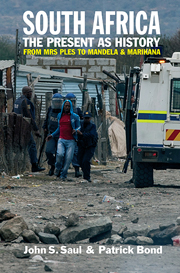Book contents
- Frontmatter
- Dedication
- Contents
- Introduction: South Africa in History
- Part I What's Past is Prologue: From the Beginnings to 1994
- Part II The Present as History: Post-Apartheid and Post-1994
- 4 Contradictions Subside then Deepen: Accumulation and Class Conflict, 1994–2000
- 5 Consolidating the Contradictions: From Mandela to Marikana, 2000–2012
- Part III Conclusions: The Future as History
- Bibliography
- Index
4 - Contradictions Subside then Deepen: Accumulation and Class Conflict, 1994–2000
from Part II - The Present as History: Post-Apartheid and Post-1994
Published online by Cambridge University Press: 05 December 2015
- Frontmatter
- Dedication
- Contents
- Introduction: South Africa in History
- Part I What's Past is Prologue: From the Beginnings to 1994
- Part II The Present as History: Post-Apartheid and Post-1994
- 4 Contradictions Subside then Deepen: Accumulation and Class Conflict, 1994–2000
- 5 Consolidating the Contradictions: From Mandela to Marikana, 2000–2012
- Part III Conclusions: The Future as History
- Bibliography
- Index
Summary
South Africa won its democracy in 1994. But in far too many respects, it has been a ‘choiceless democracy’ in socio-economic policy terms and more broadly a ‘low-intensity democracy’, to borrow terms coined respectively by Thandika Mkandawire for Africa, and by Barry Gills and Joel Rocamora for many ex-dictatorships. The self-imposition of economic and development policies – typically at the behest of financial markets and the Washington/Geneva multilateral institutions – required an extraordinary insulation from genuine national determinations: in short, an ‘elite transition’. This insulation of policy from democracy was facilitated by invoking the mantra of seeking ‘international competitiveness’, and initially peaked with Nelson Mandela's 1996 Growth, Employment and Redistribution policy. As Chapter 5 shows, Pretoria's obeisance to multinational corporations, revealed in this core policy, helped to mould the platinum belt in a manner that inexorably led to the Marikana Massacre. In the South African case of low-intensity democracy, it must be stressed, the decision to reduce any real room for strategic manoeuvre was made as much by the local principals as it was by the Bretton Woods Institutions, other financiers and investors.
As these next chapters document, South Africa's democratization was profoundly compromised by an intra-elite economic deal that, for most people, worsened poverty, unemployment, inequality and ecological degradation, while also exacerbating many racial, gender and geographical differences. In this chapter we consider the critical choices and outcomes from 1994–2000.
- Type
- Chapter
- Information
- South Africa - The Present as HistoryFrom Mrs Ples to Mandela and Marikana, pp. 145 - 175Publisher: Boydell & BrewerPrint publication year: 2014

